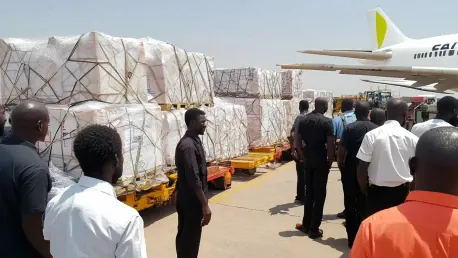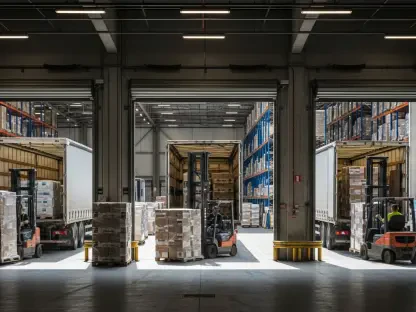The air cargo industry in Africa is undergoing rapid transformation, influenced by a mix of economic, infrastructural, and technological factors. The industry’s future looks promising, driven by the continent’s strategic positioning and growing demand for efficient logistics solutions. However, several challenges persist, which stakeholders must address to sustain this growth.
Growth Trends and Economic Catalysts
Increasing Demand and Strategic Positioning
The demand for air cargo in Africa has notably grown, supported by IATA data showing significant year-over-year increases. In January 2025, global air cargo markets saw a 3.2% rise compared to January 2024, with international operations experiencing a 3.6% increase. African airlines, in particular, recorded an 8.5% rise in demand last year, showcasing the region’s booming air cargo sector. This impressive growth can be attributed to Africa’s strategic location between key global markets like Asia, Europe, and the Americas. This geographic advantage has spurred the development of centralized networks at several African airports, transforming them into major cargo hubs.
Key airports such as Nairobi, Cairo, and Johannesburg now serve as major cargo hubs, benefiting from this geographic advantage. Nairobi stands out as the busiest cargo airport in Africa, followed closely by Cairo and Johannesburg. Other significant hubs emerging include Addis Ababa, Casablanca, and Lagos. These airports have invested heavily in infrastructure to manage the growing volume of air cargo, improving logistics efficiency and reducing transit times. Africa’s geographic positioning between major trade routes has made it an attractive region for logistics companies looking to optimize their global supply chains, further boosting demand for air cargo services.
Middle Class Expansion and E-Commerce Boom
Another significant driver of growth in the African air cargo industry is the expansion of the middle class and the rise of e-commerce. As more African households experience higher income levels and urbanization continues to rise, there is a marked increase in the demand for international and high-value goods. These goods often require efficient air cargo services to ensure quick delivery. The rise of smartphones, increased internet access, and growing comfort with online shopping have fueled an e-commerce boom across the continent.
Global e-commerce giants like Amazon have entered the African market, and local platforms such as Jumia and Takealot are rapidly expanding their operations. This surge in online shopping has heightened the need for quick and reliable air freight services to meet customer expectations for speedy deliveries. The e-commerce sector is projected to grow at a compound annual growth rate (CAGR) of 8.46% from 2025 to 2029, reaching an estimated value of $56.03 billion by 2029. To capitalize on this opportunity, logistics providers are investing in air freight capabilities to offer better service for high-value and time-sensitive goods.
Infrastructure and Technological Advancements
Airport Upgrades and Modernization
African airports are investing heavily in infrastructure upgrades to meet the rising demand for air cargo. For instance, Cairo International Airport is currently undergoing significant expansion, including the construction of a new terminal and the upgrading of existing facilities to position itself as a key global aviation center. These efforts to expand and modernize are crucial to managing increased cargo volumes efficiently. Other airports across the continent are following suit, modernizing their facilities to improve cargo handling processes and reduce turnaround times.
Modernization efforts include the implementation of advanced cargo handling technologies and the expansion of warehouse capabilities. Airports have introduced automated systems for cargo sorting and tracking, significantly enhancing operational efficiency. By adopting these technological advancements, airports can process more cargo at a faster rate, meeting the rising demand while ensuring high standards of safety and compliance. This not only reduces delays but also minimizes the risk of damage to goods, particularly for perishable and high-value items, which are vital to maintaining profitability in the air cargo industry.
Cold Chain Logistics and Technological Integration
To support the export of perishable and high-value goods, there has been an increased investment in refrigerated cargo facilities and cold chain logistics across African airports. Major exporters like Kenya, Ethiopia, and South Africa are enhancing their infrastructure to manage pharmaceuticals, perishable goods, and high-value electronics. Given the dominance of these sectors in African exports, maintaining temperature control and ensuring timely delivery are crucial. Airports have upgraded their cold storage capabilities to meet the stringent requirements of these industries, making them more competitive in the global market.
Technological integration also plays a significant role in optimizing air cargo operations. Airports are adopting digital platforms for cargo tracking and automated systems for cargo handling. These innovations improve transparency, allowing stakeholders to monitor shipments in real-time and make informed decisions based on accurate data. The integration of advanced technologies with traditional logistics practices ensures more reliable and efficient services, reducing the risk of spoilage for perishable goods and enhancing overall customer satisfaction. As technological advancements continue, the African air cargo industry is well-positioned to capitalize on the growing demand for sophisticated logistics solutions.
Challenges in the African Air Cargo Industry
High Operating Costs and Infrastructure Gaps
Despite the positive growth trends, the African air cargo industry faces several significant challenges, primarily high operating costs and infrastructure gaps. High expenses related to cargo handling fees, fuel costs, and freight taxes make it difficult to sustain profitability, particularly when compared to other regions with more cost-effective solutions. These high costs undermine the value proposition of air cargo services, posing a barrier to widespread adoption, especially for smaller businesses that require affordable logistics options.
Infrastructure remains a crucial issue, as more than 50% of Africa’s airports lack sufficient cargo facilities. This inadequacy leads to inefficiencies such as delays, increased handling times, and potential damage to perishable goods. Poor infrastructure hinders the optimized movement of goods, affecting not only the service quality but also the operational costs for airlines and logistics providers. Enhancing cargo facilities, streamlining customs processes, and improving overall airport infrastructure are essential steps to address these gaps and foster a more conducive environment for air cargo growth.
Geopolitical Instability and Security Risks
Geopolitical instability and security risks further complicate the African air cargo landscape. Political instability and regional conflicts, such as those in Sudan, can result in airspace closures and longer travel times. These disruptions affect the reliability of air freight services, leading to uncertain delivery schedules and higher operational costs. Additionally, security risks, including smuggling and threats to crew safety, pose significant obstacles that necessitate stringent measures to protect cargo and personnel.
To mitigate these challenges, airports and airlines must collaborate closely with government authorities to ensure safe and secure operations. Investments in advanced security technologies, comprehensive staff training programs, and robust regulatory frameworks are needed to enhance security measures across the region. By addressing geopolitical and security issues proactively, the African air cargo industry can create a more stable and secure logistics environment, essential for sustaining growth and maintaining global competitiveness.
Expansion and Development Initiatives
Investment in Airports and Intermodal Connectivity
In response to the growing demand for air freight and the need to address existing challenges, many African countries have started investing in their airport and logistics infrastructure. Significant improvements include the expansion of airport terminals and cargo facilities to increase handling capacity. Major airports, including Nairobi’s Jomo Kenyatta International Airport, Cape Town International Airport, and Lagos’ Murtala Muhammed International Airport, have been renovated to handle both passengers and cargo more efficiently. These renovations often involve constructing new cargo terminals, enhancing warehousing capabilities, and streamlining customs procedures.
Intermodal transport links, including road and rail connectivity, are also being enhanced to facilitate smoother cargo movement from airports to inland destinations. Better connectivity ensures quicker and more reliable transport of goods, bridging the gap between air freight and other logistics methods. Public-private partnerships are encouraged to mobilize resources for upgrading facilities and improving service delivery, fostering a collaborative approach to infrastructure development. By investing in comprehensive logistics networks, African countries can improve the overall efficiency and competitiveness of their air cargo industry.
Competition from Sea Freight and Need for Innovation
Simultaneously, the air cargo industry in Africa faces increasing competition from the sea freight sector, which is also undergoing significant improvements. Many African countries are investing in port infrastructure to make sea freight more competitive in terms of cost and capacity. Sea freight offers a more cost-efficient solution for transporting bulk commodities and non-perishable goods, presenting a challenge for the air cargo sector. To compete effectively, the air cargo industry must continually adapt and innovate, leveraging technology and improving service delivery.
Maintaining a competitive edge requires air cargo operators to focus on the strengths of air freight, namely speed and reliability. Investing in advanced logistics technologies, optimizing supply chain processes, and enhancing customer service are critical strategies for the air cargo industry. Additionally, focusing on niche markets such as high-value and perishable goods, where air freight has a distinct advantage, can help sustain growth despite the competition from sea freight. Innovation and agility will be key to navigating this competitive landscape and ensuring the continued success of African air cargo operations.
The Future of the African Air Cargo Industry
The air cargo industry in Africa is experiencing a swift evolution, driven by a mix of economic growth, infrastructure development, and technological innovations. The sector’s future holds significant promise due to the continent’s strategic geographical location and the rising demand for advanced logistics solutions. African countries are increasingly becoming vital hubs for international trade, positioning the air cargo industry for considerable expansion. However, numerous challenges must be addressed by stakeholders to ensure sustainable growth. These include upgrading infrastructure, improving regulatory frameworks, enhancing security measures, and fostering skilled labor in the industry. Additionally, ensuring that technological advancements are accessible across the entire continent is crucial for maintaining competitiveness. The collaboration between private and public sectors will play a pivotal role in overcoming these barriers and unlocking the full potential of Africa’s air cargo industry. Addressing these issues promptly is essential for capitalizing on the opportunities available and ensuring the industry’s long-term success.








